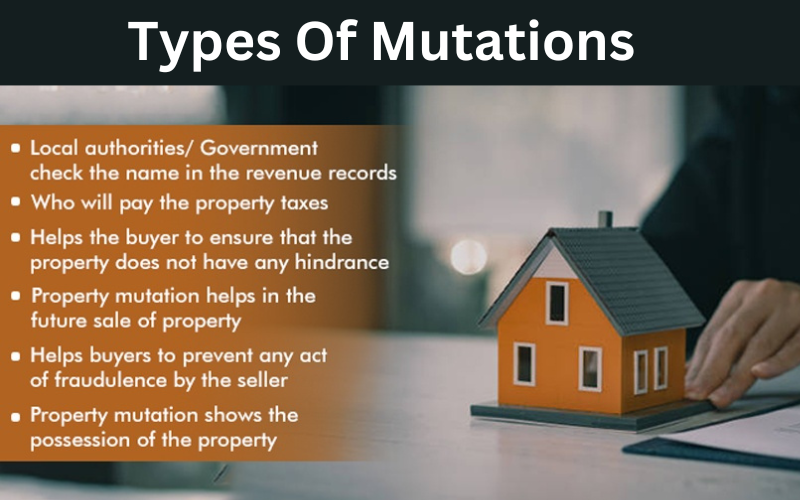Mutation in revenue records refers to the official process of updating land ownership records after a property transaction or change in ownership. In India and Pakistan, especially in the Punjab region, mutation in land records is crucial for recognizing the new owner in the government’s revenue records.
Mutation does not grant ownership but reflects ownership changes recorded through legal documents such as sale deeds, inheritance, or court orders. The updated record, called Jamabandi, is critical for future land dealings, tax calculations, and avoiding disputes.
Importance of Mutation in Land Records and Property Ownership
- Legal proof of ownership change
- Basis for property tax assessment
- Ensures eligibility for government schemes and compensation
- Protects against fraudulent claims or disputes
- Required for land development permissions
Common Types of Mutations in Revenue Records
The types of land mutations vary depending on the nature of ownership change. Below are the most common land revenue mutation types recognized by authorities in Punjab, India, and Pakistan:
1. Inheritance / Succession Mutation
- Also known as “Varisati Intiqal”
- Occurs when property ownership transfers to legal heirs after the death of the original owner
- Based on the legal heirship certificate or succession certificate
- No stamp duty generally applicable but mutation fee applies
2. Sale / Purchase Mutation
- Reflects the transfer of land ownership through registered sale deeds
- Mandatory for property buyers
- Often involves verification of land registry and mutation difference for clarity
- Requires payment of mutation fee and charges
3. Gift Deed Mutation
- Mutation based on a registered gift deed
- Common among family members transferring property without consideration
- Subject to stamp duty laws of the respective state or province
4. Mortgage Mutation
- Required when property is mortgaged to banks or financial institutions
- The mutation indicates the mortgage interest of the lender
- Removed once the mortgage is cleared
5. Partition Mutation
- Occurs when joint property is divided among co-owners or family members
- Supports claims for independent possession
- Based on a registered partition deed or family settlement
6. Exchange Mutation
- Reflects property ownership change due to mutual land exchange between parties
- Requires a registered exchange deed
7. Court Decree Mutation
- Occurs based on court orders, such as:
- Property dispute judgments
- Specific performance suits
- Property dispute judgments
- Mutation executed once the decree attains finality
8. Release / Relinquishment Mutation
- Applied when a co-owner releases their share in favor of another
- Needs a registered relinquishment or release deed
9. Lease Mutation
- Mutation entry made when property is leased for a specified period
- Especially relevant for agricultural or government lands
Mutation Process and Legal Requirements
Understanding the property mutation process helps avoid delays and legal issues.
Documents Required for Mutation
| Mutation Type | Required Documents |
| Inheritance | Death certificate, legal heir certificate |
| Sale/Purchase | Registered sale deed, payment proof |
| Gift | Registered gift deed |
| Mortgage | Mortgage deed or loan documents |
| Partition | Partition deed or family settlement |
| Court Decree | Certified copy of court judgment |
| Release/Relinquishment | Registered release deed |
| Lease | Lease agreement |
Verification Process

- Physical site verification
- Public notice period to raise objections
- Recording of statement (if required)
- Mutation entry into Jamabandi / land records
Timeframe and Mutation Fees
- Timeline: 15-30 working days depending on jurisdiction
- Mutation Fee and Charges: Nominal fees; varies by province/state
- Additional stamp duty applies to some mutation types (sale, gift, etc.)
Why Mutation is Important in Land Revenue Records?
- Legally confirms ownership in government records
- Essential for selling, leasing, or mortgaging land
- Prevents property disputes and fraud
- Required for:
- Agricultural subsidies
- Crop loans
- Land acquisition compensation
- Agricultural subsidies
Common Challenges and Mistakes in Mutation Process
- Failure to mutate after purchase or inheritance leading to disputes
- Incorrect documentation
- Delay in updating Jamabandi
- Overlooking mutation fee
- Confusion between land registry and mutation difference: Registry transfers title; mutation updates revenue records

FAQs About Mutation in Revenue
What is the difference between land registry and mutation?
- Land Registry: Legal transfer of ownership (title change)
- Mutation: Updating revenue records reflecting ownership
Is mutation mandatory after property purchase?
Yes, mutation is crucial after purchase to update land records for tax and ownership purposes.
How can I check mutation status in Punjab?
Visit the official land records portal of Punjab (India or Pakistan) or contact the local revenue office.
What is the mutation fee?
Mutation fee varies by area and property type but is usually nominal. Stamp duty may apply to certain transactions.
What happens if mutation is not done?
Without mutation, the previous owner’s name remains in records, leading to:
- Property disputes
- Ineligibility for loans
- Problems in future sales
Can mutation be challenged?
Yes, mutation entries can be challenged in the revenue courts if fraud or procedural lapses are proven.
Conclusion: Importance of Timely Mutation and Legal Ownership
Understanding the types of mutations in revenue is vital for anyone dealing with land and property in the Punjab region. From inheritance to court orders, each mutation type plays a role in protecting ownership rights and ensuring legal clarity in land records.
Timely mutation:
- Protects your ownership rights
- Avoids legal disputes
- Facilitates smooth property transactions
- Ensures access to government schemes and compensation
Whether you are a landowner, farmer, legal advisor, or real estate professional, staying updated on mutation of property rules is critical for safeguarding land assets.



Leave a Reply